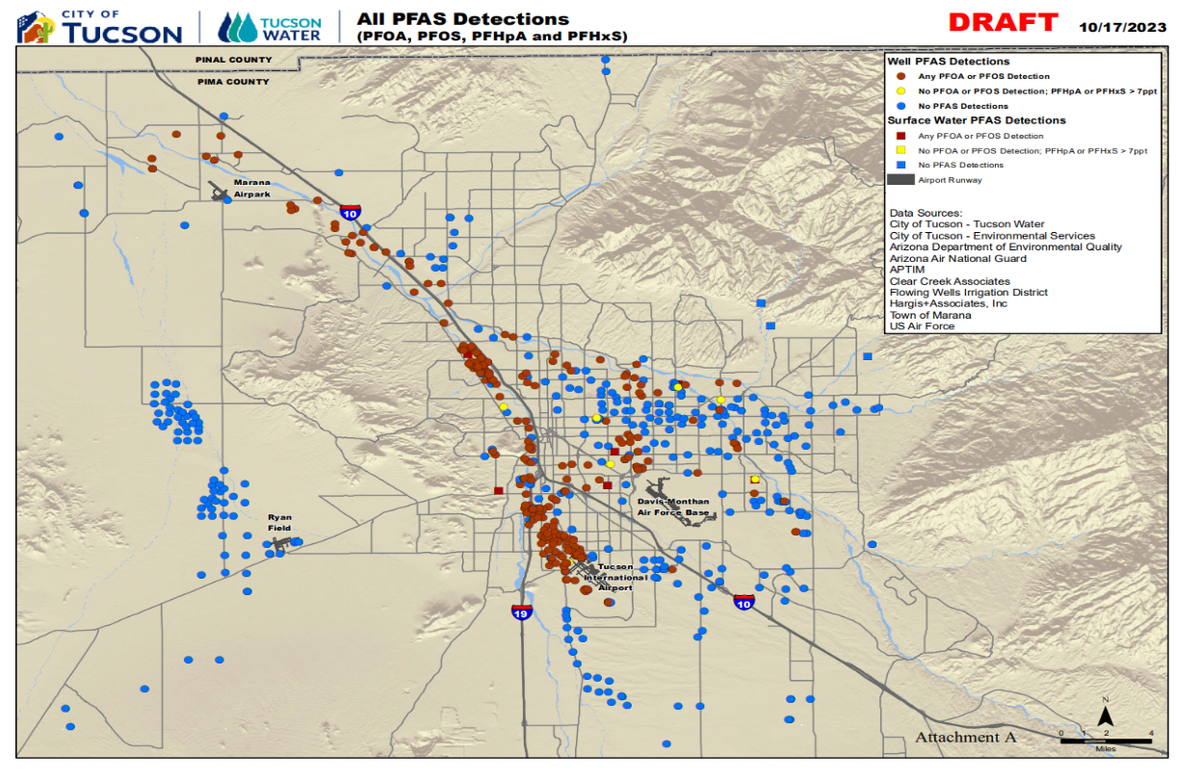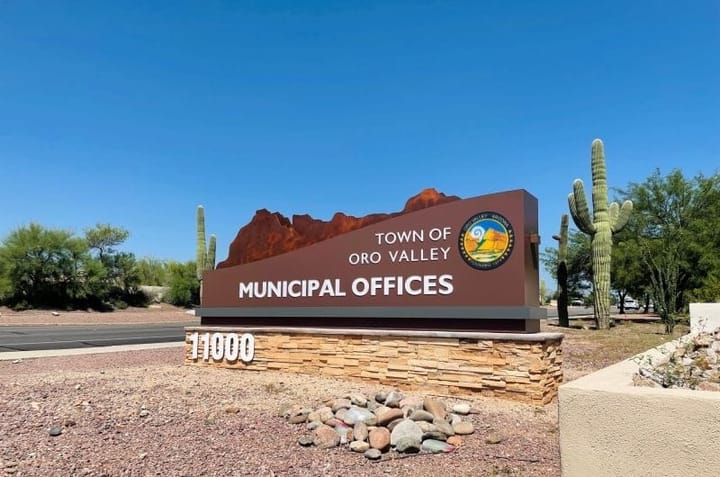Tucson Water hits milestone in forever chemical testing
Earlier this year, Tucson Water hit a milestone when it analyzed its 10,000th sample for PFAS contamination, 15 years after it began testing in 2009.

Forever chemicals, or PFAS, in Tucson’s groundwater have been a hot topic in recent months, largely due to a clash between the U.S. Air Force and Environmental Protection Agency over a cleanup plan for a superfund site near the airport.
But the issue of PFAS, officially called polyfluoroalkyl substances but referred to as "forever chemicals" due to their persistence in the environment,extends far beyond the airport and has impacted hundreds of thousands of Tucson residents over the years.
This has led to extensive federal, state and local action, including several ongoing projects aimed at protecting and treating the city’s drinking water supply.
Earlier this year, Tucson Water hit a milestone when it analyzed its 10,000th sample for PFAS contamination, 15 years after it began testing in 2009.
These forever chemicals primarily originated from firefighting foam used at military bases, and have become a major hazard for Tucson’s groundwater supply.
But Tucson Water and city officials are adamant that they’re taking a proactive approach to keeping consumers safe, which Tucson Water Director John Kmiec addressed during an interview with Bill Buckmaster and Caitlin earlier this month,
"We want to make sure that Tucson Water customers know that no PFAS chemicals are delivered through the water system," he said. “When I saw that number come about (is ‘about’ the right word?) of 10,000 (samples tested), that’s just an incredible number of what our team (of local scientists) has been doing out at the Tucson Water Quality Lab, in addition to all the regulatory stuff we have to do.”
Tucson Water is responsible for ensuring that the city’s drinking water meets federal, state and local regulations. It monitors water quality at hundreds of permanent sampling taps, wells, reservoirs and homes and collects chlorine and microbiological samples each month, right in its very own lab.
“Tucson Water is one of the first utilities in the country to actually be accredited to do PFAS testing in our certified Water Quality Lab. We’ve been certified for several years, which allows us to quickly and rapidly test our water system, test our treatment facilities and make sure that our water system that we deliver is PFAS free while we do those investigations.”
Since 2016, Tucson Water has shut down close to 30 wells due to PFAS contamination, with Kmiec saying the lab can detect less than two parts per trillion, which he equated to a drop of water in 26 Olympic-sized swimming pool volumes.
He explained that the Santa Cruz River’s flow has contributed to the chemicals’ spread over the years. While most of the contamination was along the river north and northwest of Davis-Monthan and Tucson International Airport, stormwater and effluent have moved it to other parts of the city’s groundwater supply
During an August update to the Tucson City Council, Kmiec said the EPA’s recent finalization of national drinking water regulations have made a big impact on Tucson Water’s efforts to address groundwater contamination.
“This has been something that we've been encouraging and waiting for for many years,” Kmiec said.
He also touched on the Central Tucson PFAS Project, which was started four years ago to prevent further contamination to Tucson Water’s central wellfield, which serves as the primary drinking water source for over 65,000 residents and an alternative source for 600,000 more.
Initial funding for the Central Tucson PFAS Project allowed for the installation of seven monitoring wells by the Arizona Department of Environmental Quality, which is developing a 3-D model to simulate groundwater flow in central Tucson.
The project has already treated nearly 220 million gallons of groundwater since the first test became fully operational in 2022, using a method that reduces PFAS and PFOS to undetectable levels.
“Rigorous testing over the years have( he said ‘have,’ not ‘has’?) identified several areas of the aquifer in the Tucson base and(should the word ‘and’ be there?) that need to be avoided to ensure PFAS compounds are not unknowingly distributed to the community,” said Kmiec.
In addition to the Central Tucson PFAS Project, work continues to move along in other parts of the city.
A new Tucson Water PFAS treatment facility on the city’s northwest side, near Ina Road and Camino De Oeste, received final approval from the Water Infrastructure Finance Authority of Arizona and Tucson’s Mayor and council last fall.
Tucson Water is working with the city to hire a consultant to design the facility, as well as a pipeline to bring water from the wells for treatment.
“The mayor and council has been incredibly proactive in ensuring that regardless of the power jockeying and finger pointing, especially early on, we took measures immediately. Very expensive, decisive steps to construct a treatment plant and to get on top of the needs of Tucson Water to keep our water safe and clean,“ said councilwoman Karin Uhlich. “We recognize and take very seriously our responsibility to safeguard our water supply.”
Angelina Maynes is a journalism major at the University of Arizona and reporter with Tucson Spotlight. Contact her at angelinamaynes@arizona.edu.





